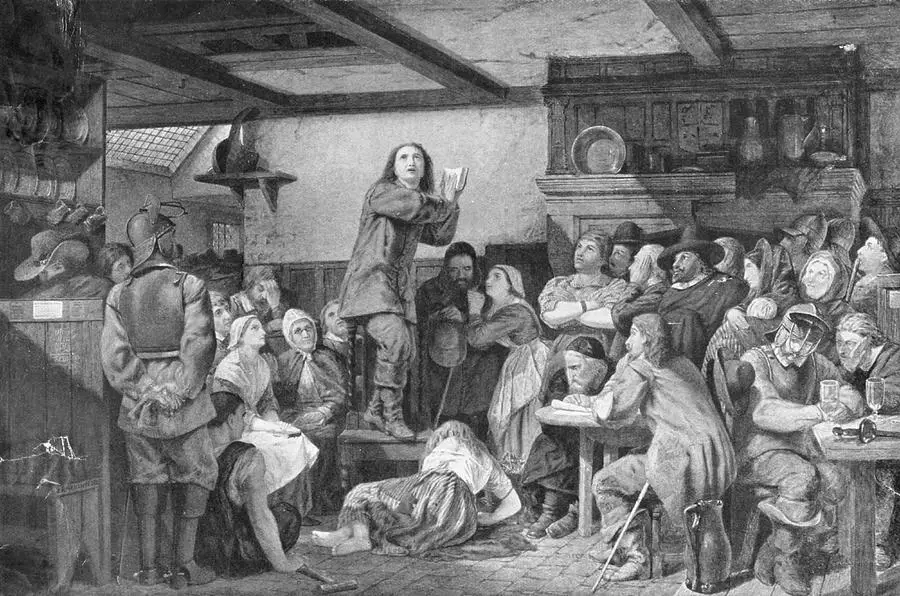When it comes to the topic of alcohol consumption, the Religious Society of Friends, commonly known as Quakers, presents a unique perspective that blends tradition, principles, and personal choices.
Quakerism, known for its emphasis on simplicity, equality, and spiritual experiences, has a unique approach to various aspects of life. Among these aspects, the stance on alcohol consumption stands out as a topic of curiosity.
In this article, we’ll delve into the historical context and modern outlook regarding Quakers and alcohol.
Table of Contents
ToggleThe Origins of Quakerism

Quakerism, also called the Religious Society of Friends, broke away from conventional religious norms in the 17th century, marking a significant departure from tradition. Founded by George Fox in England, Quakerism rejected formal rituals and hierarchical structures in favor of a more direct and personal connection with God. This connection was driven by a deep spiritual experience that guided their beliefs and actions.
Fundamental Quaker Values
In the heart of Quakerism lies a set of guiding principles that have shaped their beliefs and way of life for centuries. These fundamental values form the foundation upon which Quakerism was built.
Simplicity
Quakers deeply value simplicity. They prioritize focusing on what truly matters. This way of life extends to their relationship with alcohol and other aspects of life.
Equality
Quakerism is marked by a commitment to equality. They believe in the inherent worth of every individual, regardless of their social standing. This belief guides their interactions with others, promoting respect and dignity for all.
Spiritual Experience
Quakerism emphasizes a direct connection with the divine. They hold that each person can experience a personal connection with God without any intermediaries. This focus on inner spirituality shapes their distinctive approach to faith and practice.
Early Quaker Views on Alcohol
During the emergence of Quakerism in the 17th century, alcohol was not explicitly forbidden to Quakers. However, the Quaker approach to alcohol consumption has been marked by a strong tendency toward moderation and abstinence.
Quaker Stance on Alcohol and Tobacco
Quakers did not establish an outright ban on alcohol or tobacco use, but their beliefs guided them toward cautious and thoughtful consumption. According to their “Faith & Practice,” Quakers were encouraged to consider limiting or refraining from the use of alcohol, tobacco, and other habit-forming substances due to the potential harm they could cause.
Diverse Involvement with Alcohol
Interestingly, historical records reveal a varied engagement of Quakers with alcohol-related activities. Some early Quakers owned inns where alcoholic beverages were served alongside meals and lodging. While the sale of alcohol was accepted in these contexts, Quakers were expected to follow their principles and responsible behavior. The sale of alcohol, when combined with other services, was considered a normal business practice at the time.
Historical Context of Alcohol Consumption
In the 18th century, the consumption of spirits, particularly gin, was on the rise in Britain. The Quaker Yearly Meeting of 1751 expressed concern about the excessive consumption of alcohol and urged Friends to try alcohol in moderation. Excessive drinking was viewed as dishonorable and harmful.
During the 19th century, alcohol was considered a safer option than contaminated water and was perceived as beneficial for daily labor. However, as nonconformist groups like the Methodists and Quakers gained influence, they lobbied for restrictions on alcohol sales through Parliament.
The Temperance Movement
In the 19th century, Quakers played an active role in the Temperance Movement, a widespread social reform effort aimed at reducing alcohol consumption and its associated problems. As part of this movement, Quaker Meeting Houses became alcohol-free spaces, reflecting their dedication to keeping up with their values.
Quaker Involvement in the Temperance Movement
The Quaker’s involvement in the Temperance Movement extended even to their commercial activities. With the rise of cocoa drinks in the 19th century, Quakers saw an opportunity to promote an alternative to alcoholic beverages. They believed that cocoa, with its medicinal properties, could serve as a healthier and non-alcoholic option. This led to the introduction of chocolate drinks and the expansion of what was often referred to as an ‘innocent trade.’
During that era, the perspectives of Quakers on alcohol were molded by their dedication to responsible conduct and the well-being of their community.
Evolution of Quaker Attitudes
Over time, Quaker’s attitudes towards alcohol have evolved while staying true to their core values. This modern evolution showcases their ability to adapt without compromising their principles.
Balancing Simplicity and Individual Choices
Quakers, famous for their simplicity, have moved beyond strict rules. This is clear in how they see alcohol. Some Friends don’t drink at all, while others do so in moderation. This shows that for Quakers, being simple means living in line with their own beliefs, not just following fixed rules.
Social and Spiritual Considerations
Quakers recognized that alcohol, tobacco, and substance abuse can harm health and relationships. These behaviors might make people less sensitive to others and disconnect them from their spiritual side. Quakerism encourages thinking about whether these substances fit with their values.
Upholding Integrity and Moral Responsibility
The importance of integrity for Quakers is timeless. Despite changing viewpoints, Quakers steadfastly make deliberate choices aligned with their convictions. They’re advised not to yield to societal influences but to stand firm in their integrity when deciding about substance use.
Conclusion
In the realm of Quaker beliefs and alcohol consumption, the story is one of adaptation and individuality. Quakers, guided by values of simplicity, equality, and spiritual experience, have evolved their attitudes towards alcohol over time.
From the early days of not being strictly forbidden but advocating moderation to modern times where choices range from abstinence to moderation, Quakers show that personal convictions can harmonize with shifting norms. This journey reminds us that faith can coexist with change, shaping a dynamic and thoughtful approach to life’s choices.

I am a passionate beer connoisseur with a deep appreciation for the art and science of brewing. With years of experience tasting and evaluating various beers, I love to share my opinions and insights with others and I am always eager to engage in lively discussions about my favorite beverage.
















